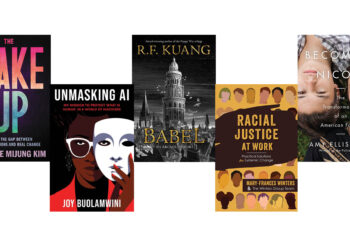
- Image via Wikipedia
While the plight of newspapers has been a fixation in the mass media (and, admittedly, on this blog), the less scrutinized struggles of university presses are now becoming apparent. New cost equations, new financial realities, faltering endowments, and new opportunities are all making the next steps for university presses vitally important.
According to a recent story from Inside HigherEd, the University of Michigan Press says:
it will shift its scholarly publishing from being primarily a traditional print operation to one that is primarily digital. Within two years, press officials expect well over 50 of the 60-plus monographs that the press publishes each year — currently in book form — to be released only in digital editions. Readers will still be able to use print-on-demand systems to produce versions that can be held in their hands, but the press will consider the digital monograph the norm.
This follows announcements of layoffs at the University of Missouri Press and the SUNY Press, and the report that Utah State University Press may be forced to close altogether.
The shift to digital offers many advantages, and print on demand (POD) technologies are coming into their own just in time if the goal is still to make printed materials. But the economics of POD are radically different, and the challenge will shift from a production challenge to a marketing challenge.
If presses can retool to meet these new challenges, they might survive, and even thrive. But time is short.
In fact, these times might be eminently suited to a reinvented university press, one that celebrates and validates blogging as a way of unleashing niche knowledge and subject-level passion, that uses the superior distribution of the Internet to achieve mainstream visibility, and that replaces an organizational structure based on the scarcity model (centralized decision-making and intermediation) with one based on plenty (decentralized authority and apomediation).
Could a blogging network of university presses work?
Discussion
9 Thoughts on "University Presses: Missing an Opportunity?"
As elsewhere on the web, the concern is that such a network would increase the chaff rather than the wheat. Academics in the humanities already feel that there are too many monographs, publication driven in part by funding/assessment pressures such as the UK’s RAE.
The sort of blogging network you suggest could conceivably help university presses stay afloat, but it would do university academics a disservice by deluging them with mediocre monograph/blog output (as most scientists contend has already happened in the world of journal articles).
Ah, mediocrity! What would we do without it? I was just listening to data from a Pew study on the media, and the fact that only 25% of the public believes what is on NPR. Does that make NPR mediocre? Is abundance and choice better than a choking filter of “superiority”? For a fascinating audio session exploring these topics, listen to the recent podcast from the American History Guys at Backstory. I came away convinced that many aspects of “superiority” are really artifacts of homogeneity and suppression of diversity and dissent. Isn’t academia supposed to be about arguing ideas?
Kent: I read recently (don’t have my source!) that university presses of the future will serve as distributors for books that people want to read for pleasure, and portals for electronic scholarship, for those who need “books” to study.
Micropublishers and selfpublishers (Lulu, Smashword, etc.) will oversee the creation of “books for pleasure” (perhaps of regional significance) and university presses would distribute them.
The content of new scholarship would be entirely digital. Presumably, the creation of scholarly e-books could be managed by outsourcing to freelancers around the world (Elance, Virtual Vocation, etc.).
It might depend on whether or not university presses will be forced, at some point, to be accountable to a bottom line. If so, I believe they will still continue successfully, but with a considerably leaner staff.
What do you think?
i’m with john sack. “listening to data”=awesome!!
and — at risk of being otiose: the issue of blog sustainability is still fairly unresolved. i’ve never claimed to privilege print, and now i especially don’t given the fact that i’m now a kindle owner. but worrying about information preservation has the potential to keep me awake at night.
Depends on how you see the purpose of publishing scholarly monographs. If the point is scarcity and a version of excellence that is about the few very best, then your proposal frightens a lot of people.
If, on the other hand, you see the point as about communicating scholarly knowledge and engaging in debate, your model has a lot to recommend it.
In that model, the purpose of peer review is to maintain the standards of entry into the debate — quality of scholarship, etc. And I’m not sure how that would work in a blogging model.
But I am generally skeptical of those that think that there is too much mediocre scholarly work out there. We have many more universities. We train many more scholars. And most of them are doing excellent work. Because there are more of them, there is more to read.
![Reblog this post [with Zemanta]](http://img.zemanta.com/reblog_e.png?x-id=3760fd33-548c-432e-ba00-bbfa04353c77)


